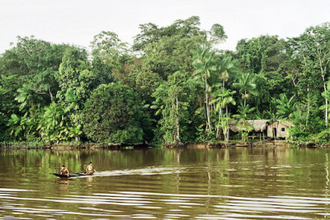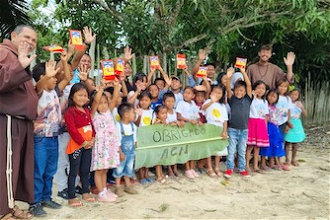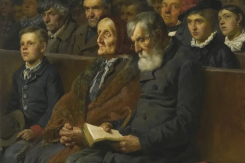Vatican unveils Preparatory Document of 2019 Pan-Amazon Synod of Bishops

Image by Francisco Chaves, Buenos Aires, Argentina - Wikipedia
Source: Vatican Media
A press conference was held yesterday to present the Preparatory Document of the Special Assembly of the Synod of Bishops for the Pan-Amazon Region, scheduled to be held in October next year, 2019, on the theme Amazonia: New Paths for the Church and for an Integral Ecology.
The speakers were His Eminence Cardinal Lorenzo Baldisseri, general secretary of the Synod of Bishops; HE Mgr Fabio Fabene, under secretary; and Rev Fr Pablo Mora, official of the General Secretariat.
Cardinal Lorenzo Baldisseri gave the following statement:
As announced by the Holy Father Francis on 15 October 2017, the Special Assembly of the Synod of Bishops, on the theme: "Amazonia, new paths for the Church and for an integral ecology", will take place in October next year, 2019. The new paths of evangelization are designed for and with the people of God who live in that region. For this reason, since the beginning of the synodal journey, the General Secretariat of the Synod of Bishops has worked in close connection with the Pan-Amazon Ecclesial Network (REPAM), an organism that carries out ecclesial activities in that region.
Although the theme refers to a specific territory, such as the Pan-Amazon region - and this is why reason we speak about the "Pan-Amazon Synod" - the reflections that concern it go beyond the regional context, because they regard the whole Church and also the future of the planet. These reflections are intended to bridge to other similar geographical realities such as, for example: the Congo basin, the Central American biological corridor, the tropical forests of Asia in the Pacific, and the Guaranì aquifer system. This great ecclesial, civic and ecological project allows us to extend our gaze beyond their respective borders and to redefine pastoral lines, making them suitable for today's times. For these reasons too the Synod will be held in Rome.
In the Pan-Amazon region, priority must be given to the native peoples who live there. These people, as Pope Francis stated in Puerto Maldonado (19 January 2018), have never been so threatened as they are now. Secondly, attention will be paid to the theme of the environment, ecology, and care for creation, our Common House. All this will be presented in the light of the teaching and life of the Church, working in the Region.
In this context today the Preparatory Document is published. This document brings together requests and suggestions, and proposes paths for an adequate preparation for the Synod Assembly.
The Preparatory Document consists of an introduction and three parts, which correspond to the method of "seeing, judging (discerning) and acting"; a method already used previously (Synod on the family) with good results. Finally, a Questionnaire is included on which the local Churches and other interested bodies will work.
The first part of the document, dedicated to "seeing", outlines the identity of the Pan-Amazon region and the urgency of listening. The topics that are addressed are: the territory; socio-cultural variety; the identity of the indigenous peoples; historical ecclesial memory; justice and the rights of peoples, and the spirituality and wisdom of the Amazonian peoples.
The Panamanian region comprises more than seven and a half million square kilometres, with nine countries sharing this great Biome (Brazil, Bolivia, Colombia, Ecuador, Peru, Venezuela, Suriname, Guyana and French Guyana) and involving seven Episcopal Conferences.
The Amazon basin is one of the major biodiversity reserves (30 to 50% of the world's flora and fauna) and of fresh water (20% of the frozen water of the entire planet) for our planet. In addition, the region has more than a third of the world's primary forests, and is a major source of oxygen for the entire earth.
This vast territory has a population of 34 million inhabitants of whom over three million are indigenous people belonging to more than 390 ethnic groups. We also include peoples and cultures of all kinds such as Afro-descendants, peasants, settlers, etc. All live in a vital relationship with the vegetation and the waters of the rivers according to their cyclical movements, such as overflows, refluxes and periods of drought.
Inhabited centres and cities in Amazonia have rapidly increased in number due to migration to the suburbs, so that today between 70% and 80% of the population resides in these centres and cities.
The richness of the forest and rivers is threatened by great economic interests, in the various points of the territory, which cause indiscriminate deforestation and the contamination of rivers and lakes, due to the use of agro-toxic substances, oil spills, mining and drug production. To all this we add a dramatic increase in human trafficking, especially in women and children, for the purpose of every kind of inhuman exploitation.
Since the first evangelization, the Church has been present in a strong and meaningful way, albeit with some darker moments, in the defence and development of peoples, up to our times, when she has became more involved with her ecclesial and social action to redeem oppressed and marginalized peoples. In this regard, the interventions of the Latin American have been particularly relevant through the documents of Medellín (1968), Puebla (1979), Santo Domingo (1992) and Aparecida (2007).
On justice and the rights of peoples, Pope Francis' orientation is clear: "I think the essential problem is how to reconcile the right to development, including social and cultural, with the protection of the characteristics proper to indigenous peoples and their territories … In this sense, the right to prior and informed consent must always prevail" (Fr. FPI).
The second part of the Document concerns "discerning" new paths starting from our faith in Jesus Christ, illuminated by the Magisterium and the tradition of the Church. Therefore, the content of this part is marked by the announcement of the Gospel in the Amazon, in its different dimensions: biblical-theological, social, ecological, sacramental and ecclesial-missionary.
The biblical stories inspire a profound reflection of the specific reality of the Amazon, of its destiny and its cosmic dimension, starting from Genesis up to Revelation. In the light of the Word of God a tension is established between the "already" and the "not yet", involving the human family and the whole world. "For creation waits in eager expectation for the children of God to be revealed. For the creation was subjected to frustration … in hope that the creation itself will be liberated from its bondage to decay and brought into the freedom and glory of the children of God (Rom 8: 19-22).
The proclamation of the Gospel has a "clear social content" (Evangelii Gaudium 177) and implies the commitment in favour of the other to improve his life and thus "make the Kingdom of God present in our world" (Evangelii Gaudium, 176).
This social and community dimension finds a relevant expression in the Amazon territory in which the ecosystem is inseparably linked with people's lives and guarantees the stability and preservation of the Common Home. It follows therefore, as Pope Francis reminds us, that in the work of evangelization "the integrity of the Gospel message must not be deformed" (Evangelii Gaudium, 39), and at the same time it cannot ignore the need for provisions that help the proclamation be welcomed better: closeness, openness to dialogue, patience, acceptance (see Evangelii Gaudium, 165).
A basic element that evangelization must consider is that of human development conceived as an integral process, well expressed with the formula, often used by Pope Francis, that "the whole world is connected", as a paradigm of integral ecology (see Laudato si', 137 -142.
Therefore, the process of evangelization of the Church in the Amazon can not be separated from the promotion and care of the territory (nature) and its peoples (cultures). To achieve this goal, it will be necessary to connect ancestral knowledge to contemporary knowledge (see Laudato si', 143-146), with particular reference to the sustainable use of the territory and to a development consistent with the values and cultures of the populations.
The desired new paths of evangelization of the Church in the Amazon can not be sustained other than by a contemplative ecclesial vision of sacramental creation and practice. Indeed, "the sacraments are a privileged way in which nature is taken up by God to become a means of mediating supernatural life. Through our worship of God we are invited to embrace the world on a different plane" (Laudato si', 235).
As the Preparatory Document states, the celebration of Baptism highlights the importance of water as a source of life and purification, facilitating the inculturation of rituals and traditions of the territory.
Likewise, the Eucharist, according to the same Document, brings us back to the "'living centre of the universe', to the overflowing core of love and inexhaustible life of the 'incarnate Son', present under the species of bread and wine, fruit of the earth and work of human hands (cf. LS 236). In the Eucharist, the community celebrates an act of cosmic love, in which human beings, together with the incarnate Son of God and all creation, give thanks to God for new life in the risen Christ (cf. LS ibidem). In this way, the Eucharist builds community, a festive, pilgrim community that becomes "a source of light and motivation for our concerns for the environment, directing us to be stewards of all creation" (LS ibidem).
At the end of the second part the document speaks of the ecclesial and missionary dimension. In this regard it is stated that in an "outbound" Church (cf. EG 46), "missionary by nature" (AG 2, Doc. Aparecida 347), all the baptized have the responsibility of being missionary disciples, participating in ecclesial life in different ways and within different areas.
The awareness of the missionary dimension ensures that the announcement implies the affirmation of moral principles also in the social order and demands respect for the fundamental rights of the person and the practice of justice in favour of the poor.
Also relevant is the religious sense of the people of Amazonia as an expression of the sensus fidei. So much so that Pope Francis himself wished to refer to it in his words in Puerto Maldonado: "I wanted to come and visit you and listen to you, to be together in the heart of the Church, unite with your challenges and reaffirm with you to a sincere option for the defence of life, for the defence of the earth and for the defence of cultures".
The Church, as Pope Francis reminds us, must be an "outbound" Church (cf. EG 46), in which all the baptized have the responsibility of being missionary disciples, participating in the life of the Church in a different way and in different contexts. In this sense, a missionary perspective in Amazonia requires more than ever an ecclesial teaching accustomed to listening to the Holy Spirit Who acts in the entire people of God, and Who guarantees the unity and diversity of the faithful.
The third part of the Document refers to "acting". In other words, it is a matter of finding new pastoral paths for a Church with an Amazonian face, with a prophetic dimension in search of better ministries and lines of action in a truly integral context of ecology.
It is Pope Francis who shows us the way to understand the expression "Amazonian face". Indeed, he stated in Puerto Maldonado: "Those of us who do not live in these lands need your wisdom and knowledge to enable us to enter into, without destroying, the treasures that this region holds. And to hear an echo of the words that the Lord spoke to Moses: 'Remove the sandals from your feet, for the place on which you are standing is holy ground' (Ex 3:5)".
What is expressed is also reflected in the Preparatory Document, which states: "the Special Assembly for the Pan-Amazonian Region is invited to find new ways of developing the Amazonian face of the Church and to respond to situations of injustice in the region" (12).
A renewed pastoral care of the Amazon requires then the need to "revive the work of the Church" (Doc. Aparecida, 11) in the territory and to deepen the "process of inculturation" (EG 126), with concrete and effective proposals.
In recent decades, thanks also to the great impulse of the Document of Aparecida, the Church in Amazonia has become aware of the need for "a greater presence, in an attempt to respond to this region's specific identity from the point-of-view of Gospel values. This implies recognizing, among other elements, its immense geographical extension, much of it often difficult to access, its broad cultural diversity, and the pervading influence of national and international interests which often seek easy economic enrichment through the region's plentiful resources. An incarnated mission implies rethinking the Church's limited presence in relation to the immensity of the territory and its cultural diversity" (14).
Indeed, to take action regarding the precarious presence of the Church and to transform it into a more grass-roots, incarnate presence, we need to establish a hierarchy of urgencies in the Amazon.
One priority is to specify the contents, methods and attitudes of an inculturated pastoral care. Another priority is to propose ministries and services for the various pastoral agents, who respond to the community's tasks and responsibilities (see 14).
As Pope Francis said, the task of the new evangelization of the traditional cultures that live in the Amazon territory and in other territories, requires us "to lend our voice to their causes, but also to be their friends, to listen to them, to speak for them and to embrace the mysterious wisdom that God wants to communicate to us through them" (EG 198). Therefore, a careful listening to these Amazonian voices and the wisdom they express will have to influence the list of priorities for the new paths of the Church in the Amazon.
In this way, the Church in Amazonia is preparing according to a "culture of encounter" (EG 20), to celebrate the Special Assembly of the Synod of Bishops of October 2019.
HE Mgr Fabio Fabene said:
After having listened to the presentation of the Preparatory Document, I would now like to illustrate the next steps towards the Special Pan-Amazon Synodal Assembly. In this sense, it should not be forgotten that a Synodal Church - as the Holy Father Francis reminds us - is a Church of listening, in the awareness that listening "is more than feeling". It is a mutual listening in which everyone has something to learn. The faithful, the episcopal college, the bishop of Rome: each listening to the others; and all listening to the Holy Spirit.
That is why the various dioceses and communities of the Amazon territory are already organizing meetings for the presentation of the text to the people of God, who will take part in the synodal journey as it is a subject of fundamental importance in listening to the voice of the Spirit. A basic reality in the Amazon context is the Pan-Amazonian Ecclesial Network (REPAM) which has already planned dozens of "assemblies" throughout the territory. It is this "consultation of the bases" that will provide real and concrete data in a synodal process.
It will be the responsibility of the Pastors to gather and summarize the suggestions, reactions and observations regarding the text of the Preparatory Document, and to elaborate brief answers to the Questionnaire, which will then be sent to the General Secretariat of the Synod by February 2019.
On the basis of the answers to the questionnaire, as for every other Synod, a second document will be prepared, known as the "Instrumentum Laboris" or "Working Document", which will be the reference text for the Synodal debate. This document should be published and sent to the Synod Fathers and other participants a few months before the Synodal Assembly is held, i.e. around the month of June 2019.
In relation to the participants of this Synodal Assembly, it must be kept in mind that there are no pre-established criteria for this type of synod in the synodal legislation, as for the Ordinary and Extraordinary Assemblies. Therefore, in this case specific criteria for participation are established for each Special Assembly.
In this regard, the criteria approved by the Holy Father for this Synod provide for the convocation of all the bishops who have the pastoral care of the Amazon territory. Thus, all the diocesan residential bishops and ordinaries who are equivalent to them according to the Law of each ecclesiastical circumscription of the Pan-Amazon Region will participate. There are 102 of them, and they are distributed as follows: Brazil (57), Colombia (14), Peru (10), Venezuela (7), Bolivia (6), Ecuador (5), English Guiana (1), French Guiana (1), Suriname (1).
To these prelates are added the presidents of the aforesaid seven (7) Episcopal Conferences involved in the Pan-Amazon Region.
Obviously, the presidency of the Pan-Amazon Ecclesial Network (REPAM) will be part of the Synodal Assembly, which has already had and will continue to play an important role in the Synod journey.
Even if it is a Synod that mainly concerns the Amazon Region, the solicitude of the whole Church will not be lacking, and for this reason representatives will also be invited for the Continental Meetings of Episcopal Conferences, such as CELAM, whose relevance in the area is obvious.
In addition, some heads of dicasteries of the Roman Curia will be involved by virtue of their skills in relation to the Synod theme.
Given the importance of consecrated life in the Amazon's ecclesial reality, we expect the participation of men and women religious, who with their ministry constitute a living witness of the Church's mission in Amazonia.
Let us also recall that the Holy Father has the prerogative to appoint other members as Synod fathers, including bishops, priests and religious, by virtue of his competence in the geographical and cultural area in question.
Finally, the following will also take part: ecclesiastical experts or lay people with competence in the subject of the Synod, ecclesiastical auditors or lay people competent in the Synod theme; fraternal delegates representing Christian religious confessions, and special guests representing other religions and various civil organizations.
See also: ICN 16 October 2017 - Pope announces Synod of Bishops in Pan-Amazonia Region www.indcatholicnews.com/news/33603





















